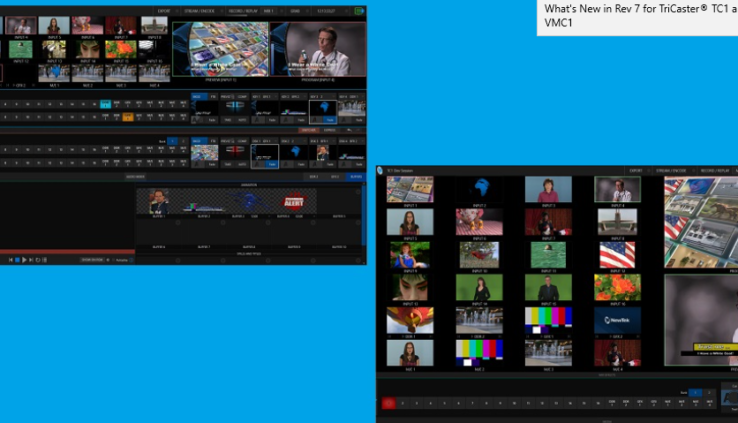What’s New in Rev 7 for TriCaster® TC1 and NewTek VMC1
By Jim Bask
From NewTek
What’s New in Rev 7 for TriCaster® TC1 and NewTek VMC1
NewTek has released TriCaster® “Rev 7” software, as a free download in Products and Updates. This software applies to the TriCaster TC1 and NewTek VMC1 multi-camera 4Kp60 IP-based live production systems. It is the second version of software for these systems, so in some marketing and support materials you may see it referred to as “v2”.
The new software includes over 20 new features, some of which are complete new workflows. An example is the Express Switcher, which provides a greatly simplified UI, which can be perfect for content creators who frequently produce less complex programs, and those who depend on less experienced operators to work their productions.
In addition, Rev 7 is required in order to take advantage of the new Premium Access subscription program. Premium Access includes several innovative and powerful new NDI applications and advanced production features for NewTek’s live production systems, plus a way for content creators to keep these up to date.
Among the new capabilities in Rev 7:
New Workflows and UI Enhancements
Express Switcher
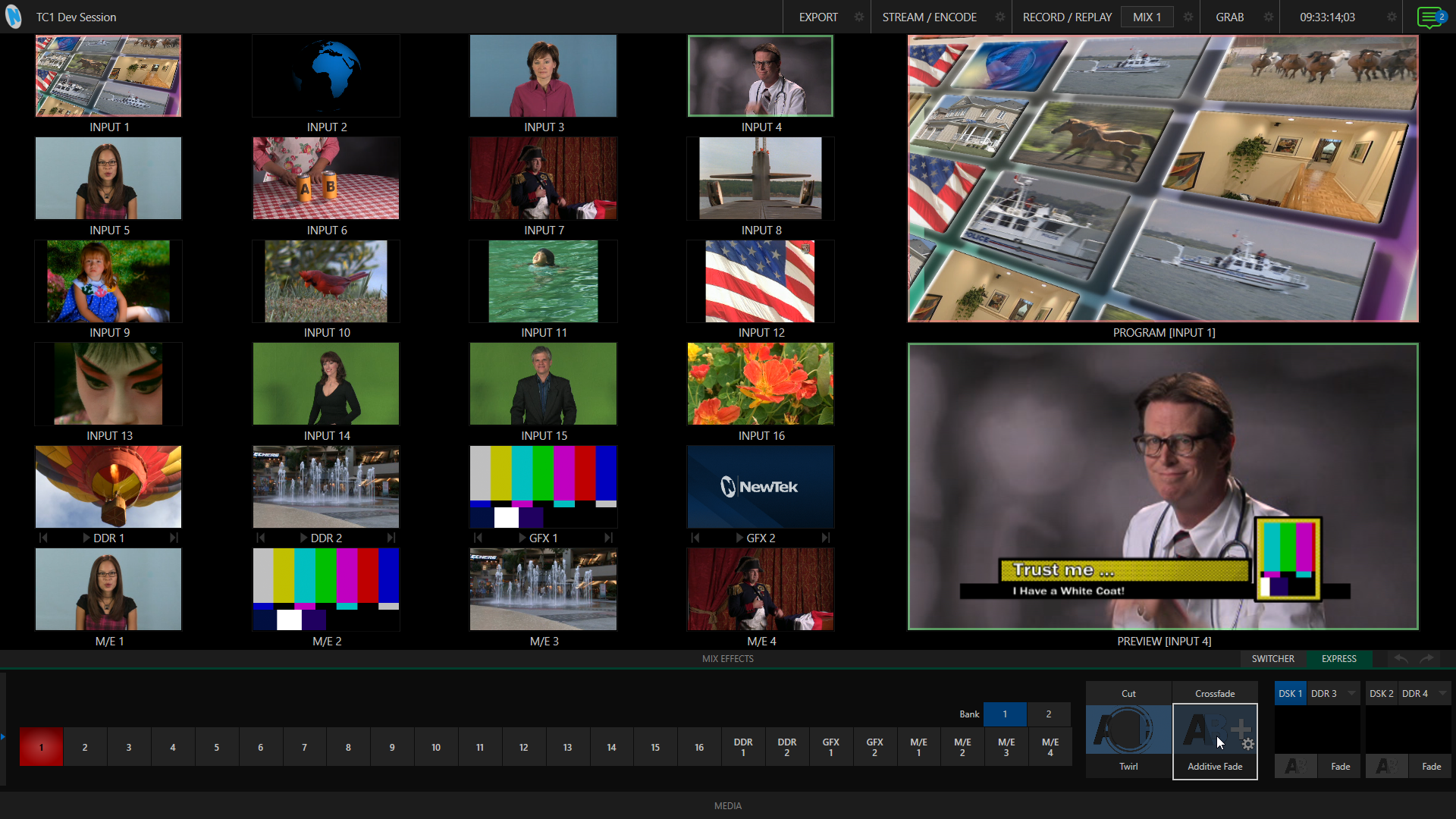
A single-row Switcher with all your available sources and your DSKs. Select from the available Fade and Take or preload a transition, and changing sources or keying graphics is a one-click operation. Much faster to learn, much faster to use, a major boon for those using volunteer operators.
Adaptive Multiview

Now you can minimize the Media Players, Audio Mixer and Buffers, and the Multiview picks up the screen real estate, making the monitors (and the new controls on them) larger and therefore easier to see.
Native Support for Touch Screens
TriCaster Rev 7 is touch screen capable, users can tap an ISO monitor in the UI to switch to that source or activate DSK, two-finger tap a viewport to open panels, and more.
Any Input Can Host a PTZ Camera
In the first version of TC1 and VMC1 software only 8 inputs could host a PTZ camera. Now they all can.
ISO Monitor Updates
Tap to Switch
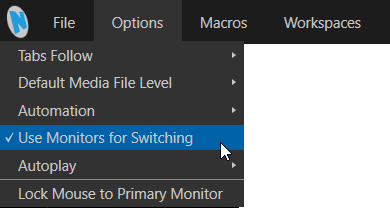
When using a touch screen monitor, the user now can turn on an option to do switching by touching the ISO monitors in the Multiviewer section of the UI.
Local Audio Control
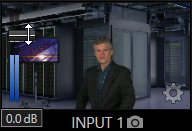
V2 adds a volume level control on rolling the mouse over the VU meter, allowing you to quickly adjust volume from any source. The Master audio mix can be adjusted when you mouse-over the Program monitor).
Media Player ISO Controls
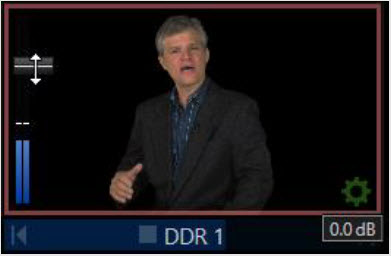
ISO monitors now sport (touch-friendly) previous, next and start/stop controls in their label area when displaying a Media Player source. There is also a progress gauge in the label.
Switcher Control Enhancements

- Delegating Video Layers: The layer label is now a delegate toggle button. Simply click or tap the label to delegate it, and the button lights in bright blue. Click it again to de-activate it, or delegate another layer at the same time by clicking its label too.
- Layer Tally: A red border around the layer thumbnail monitor indicates the layer is currently displayed on Program out.
- Transition Timing: The duration controls for Background and DSK/KEY layer transitions have been moved into the transition 9-bin, which – as before – opens when you clip the effect icon at lower left in a control group.
Smart Source Configuration
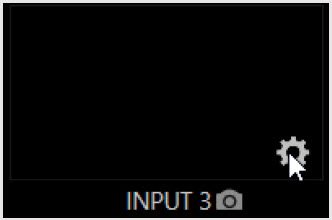
Simply click the gear shown over an ISO monitor (or, on a touchscreen, two-finger tap the viewport) to open V2’s smart Input Configuration panel. This even works with the DSK/KEY monitors embedded in the Switcher and M/E panes.
Less is More
Let’s be frank – at times the bountiful features your system offers can be overwhelming. The V2 Input Configuration panel makes extensive use of ‘twirl-down’ gadgets to group controls logically and reduce panel clutter, making it much easier to locate the settings you are looking for.

For example, color, keying and cropping options are now all found together in the Image tab.
One Stop Shopping
You’ll also find you are opening fewer panels to get the job done.

Previously, for example, configuring SDI-PTZ cameras required you to visit Input Configuration, Hardware Configuration, and the PTZ tab. Now all related settings are nested in the Source group (Input tab).
Context Sensitive Tools
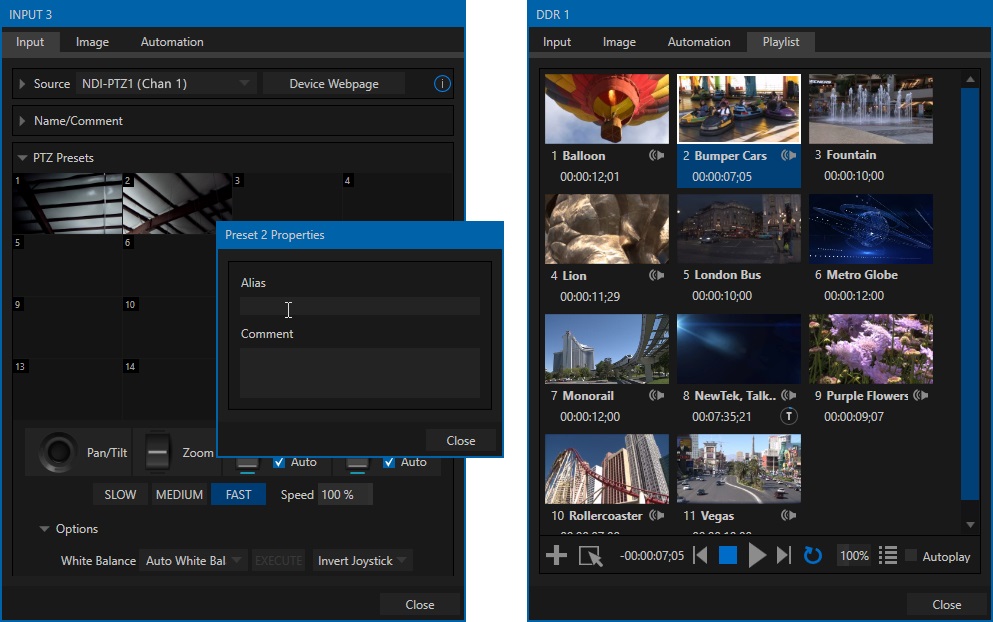
Configuration Panels are now context sensitive:
- The Input tab Configuration panel for an input assigned to a DDR now includes a playlist and most DDR controls
- Open the same panel from an input displaying a DSK, and it will include a complete set of DSK positions tools, etc., along with the DDR
- For a PTZ camera, the Input Configuration panel now includes PTZ presets and controls
- And so on for the Configuration panels for other production components in the TriCaster UI
Configuration panels have been cleaned up considerably to make room for this. (Among other benefits, PTZ setup is finally all in one place, rather than scattered in three different panes).
Context Sensitive Tools

Configuration Panels are now context sensitive:
- The Input tab Configuration panel for an input assigned to a DDR now includes a playlist and most DDR controls
- Open the same panel from an input displaying a DSK, and it will include a complete set of DSK positions tools, etc., along with the DDR
- For a PTZ camera, the Input Configuration panel now includes PTZ presets and controls
- And so on for the Configuration panels for other production components in the TriCaster UI
Configuration panels have been cleaned up considerably to make room for this. (Among other benefits, PTZ setup is finally all in one place, rather than scattered in three different panes).
More External Recorders
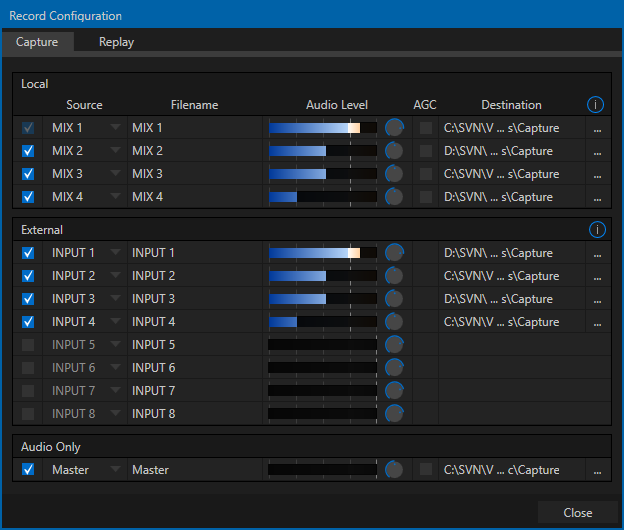
Rev 7 doubles the number of sources that can be captured externally to eight, in addition to the four main MIX (Quicktime) and MP3 recorders. This includes the ability for local capture of remote NDI
Enhanced Notifications
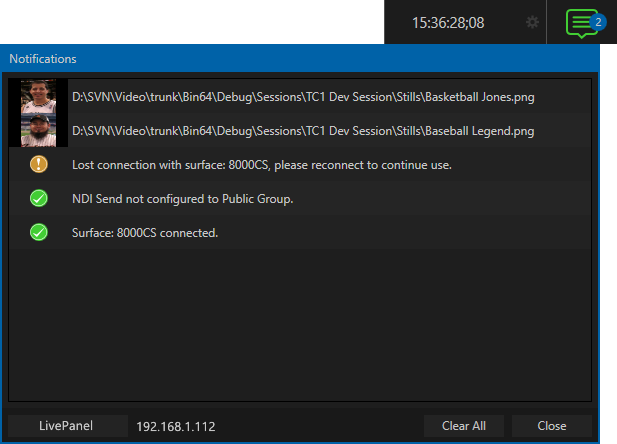
Popup notifications that appear and disappear are a thing of the past. Top right of the UI is a new Notifications icon. This opens a new Notification panel that alerts you to various events and transactions, and warns you of impending problems.
Click here to watch on YouTube
See NewTeks full article here

